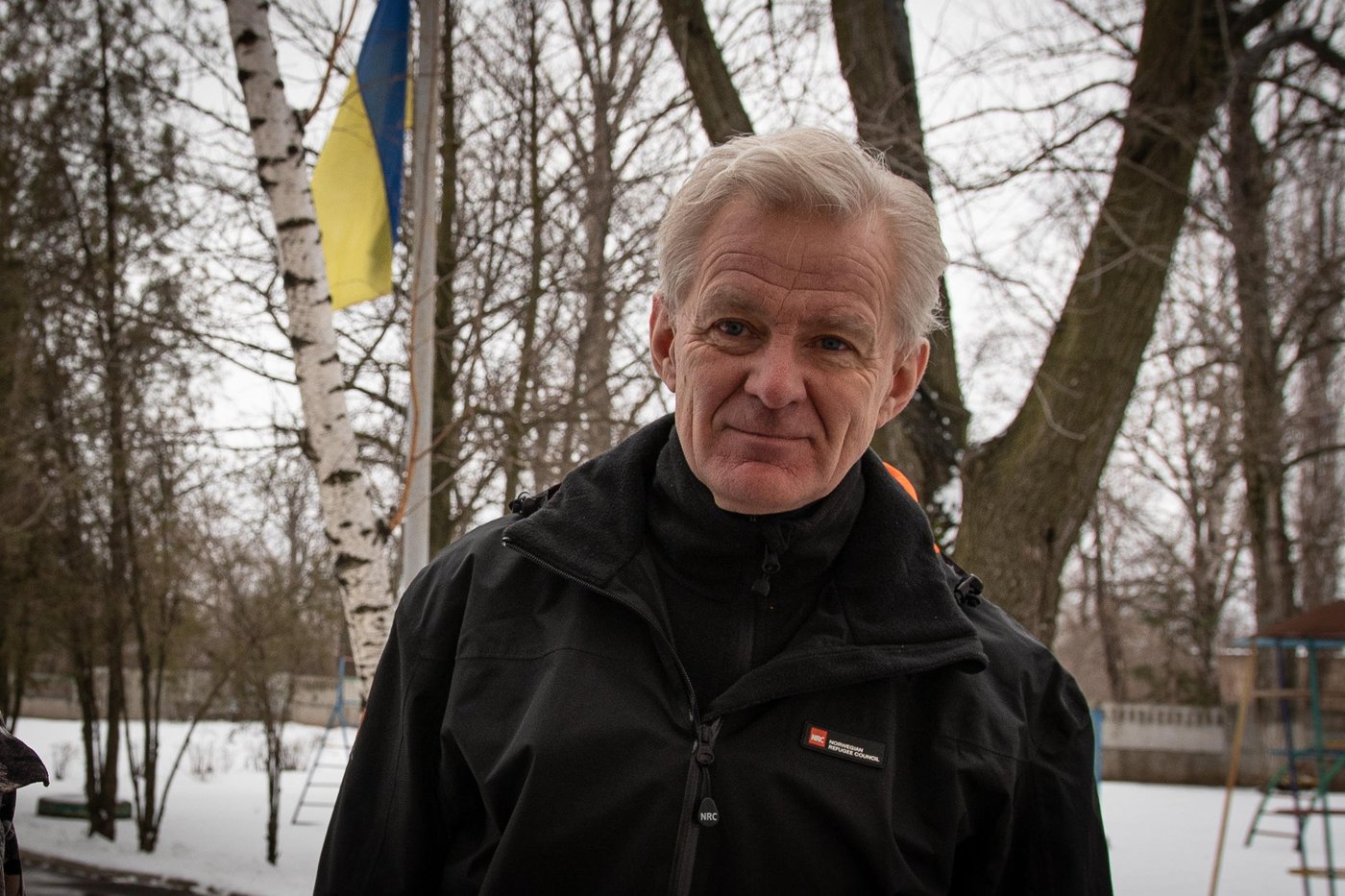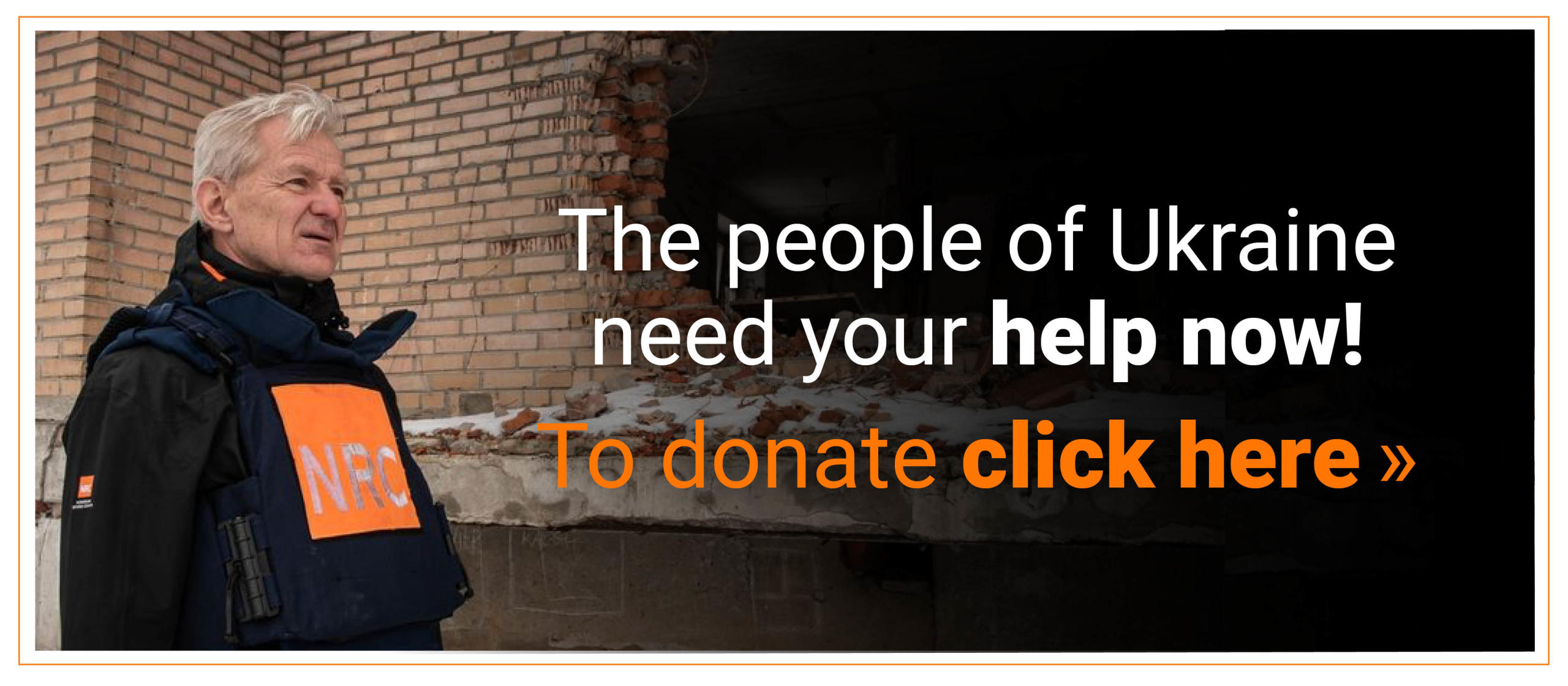What do you see as NRC’s role in responding to the crisis in Ukraine?
This is a horrific conflict that is causing enormous displacements of millions of civilians in the heart of Europe. To respond to this kind of situation is precisely why NRC was established in 1946. Sadly, we are now forced to go back to our roots, when we were set up by the Norwegian people to respond to the tremendous refugee flows in Europe that followed the Second World War.
Since then, we have developed vast expertise and experience in responding to and dealing with large involuntary displacements caused by war and repression. We are now using every hour of day and night to build an effective, efficient and principled humanitarian response both inside Ukraine and in neighbouring countries.
This operation will challenge us like never before because it is so explosive in terms of the scale and speed of human displacement.
Could you explain what the operation will involve?
Firstly, we will work within Ukraine to help communities affected by the conflict in the east of the country and elsewhere. As soon as conditions allow, we will provide emergency aid – both directly and through local partners. This will include large-scale cash distributions, food, shelter and water/sanitation support, and critical information and legal aid services.
Secondly, we are setting up bases in Poland, Moldova and Romania to help welcome and support the millions of refugees now fleeing over the borders. We will work with local partners and authorities to ensure people get basic services like housing, healthcare and education, and can earn a living to support themselves until it’s safe to return home.
And thirdly, we will start cross-border operations to get essential supplies and personnel into Ukraine from neighbouring countries.
In addition, we will continue to advocate on behalf of the civilian population, speaking out whenever we can to highlight the need for protection and humanitarian access.
I was in Ukraine myself in February, just weeks before this massive outbreak of hostilities, and I’m thinking every day and night about both the extremely vulnerable communities I met in eastern Ukraine, and our 70 colleagues who were on the ground when the fighting started.
It was announced on Thursday that Ukraine and Russia had agreed on the need for humanitarian corridors for civilians. How much of a difference will this make to the relief effort?
We are extremely disappointed that there was no agreement on a general humanitarian ceasefire, because we really need a pause in the intense fighting to be able to resume humanitarian work. We cannot save lives under a hail of bombs and grenades.
We hope that the apparent agreement on so-called “humanitarian corridors” will help civilians to escape the fighting, as many communities are trapped with little possibility to flee to safety and protection.
A humanitarian corridor sounds like it is some kind of physical, safe structure. It is not. It is actually a limited truce that defines where and when there will be a cessation of hostilities so that civilians can safely move along pre-defined roads at specific times. It requires that parties really live up to the agreement, which is often short-lived. And we now know the initial attempts at evacuation from Mariupol and elsewhere failed because there was no cessation of hostilities.
A general pause in the fighting is much better than humanitarian corridors.
How should neighbouring countries and the rest of Europe now respond to help displaced Ukrainians?
Neighbouring countries have already responded, and we are glad and thankful that all the eastern and central European nations from Poland to Moldova have kept their borders open. There are now more than 2 million refugees in neighbouring countries, and we’re only in the second week of the fighting. We have seldom if ever before seen so many people fleeing one nation at the same time.
Of course, it also gives us reason to recall that Europe, collectively, seemed to panic in 2015 when just 1 million people came across the Mediterranean during the course of a whole year. And these people ended up spread across many more countries.
We have said publicly to European nations that we hope that it is not just because your fellow Europeans are fleeing that borders are being kept open. We hope that it is because there is a renewed commitment to the Refugee Conventions. Everyone should encounter open borders and the possibility of protection in Europe if they flee from persecution and war, whether they are from Ukraine, Syria, Afghanistan or elsewhere.
What are the potential consequences of this conflict in the longer term, from a humanitarian point of view?
The consequences could actually be that we have yet another lasting mega-crisis to cope with – this time in the heart of Europe.
This could lead to people with equally urgent needs being even more neglected elsewhere. It could lead to even less cooperation between international political powers on finding solutions to ongoing crises. And it could lead to humanitarian operations outside of Europe becoming even more overstretched and underfunded.
I hope, therefore, that the generous donors who are helping us as we scale up in Ukraine will come with additional funding – and that no-one is redirecting funds from the Middle East, Africa, Asia or Latin America, where we were underfunded to start with.
While the eyes of the world are on Ukraine, how will NRC ensure that other displacement crises receive the attention and response they need?
We work by the humanitarian principle of impartiality. We help those who have the greatest needs. And therefore, we will fight for those vulnerable communities in the world’s neglected and forgotten crises. We will continue working where the largest numbers of people are facing starvation and threats to life and limb – in Afghanistan, in Yemen, in the Sahel region of Africa.
The tens of millions that were staring into the abyss and were on the brink of total collapse – they are as badly off today as they were the day the Ukraine war started. We will stay with them, even as we scale up dramatically around Europe. It’s our job.
Millions of people are now fleeing their homes, and more than a million have already fled to other countries. What is your message to those people?
To the people who flee, and to our own humanitarian workers on the ground who have also fled, we say that we will be with you – and not only for the short term, when all eyes and all global media are focusing on your plight. We will be with you for the long haul.
And we will not rest until people have the opportunity for a voluntary and safe return to their homes and get help to rebuild in peace and in security. That day will come, and we will be with you until that day.
People all over Europe and all over the world are desperate to do something to help. What’s the best thing they can do to support?
Three things.
They can support us with funding, so that we as professional humanitarians can scale up operations inside Ukraine, in the neighbouring countries, and cross-border from these countries to Ukrainians in need. So that we can work where and when the needs are greatest, with the aid that is most effective and efficient. We need funding. We frankly don’t need used clothing, especially in these early hours of the conflict.
Secondly, they can campaign for their governments and fellow citizens to receive refugees from Ukraine – but also from elsewhere – with a warm and open heart, and with a long-term commitment to support and welcome.
Finally, they can push for those in power to continue the quest for a peaceful political and diplomatic settlement to the issues that are behind this meaningless war.
NRC has already raised millions of euros from private donors towards its humanitarian appeal. Do you have a message for the many thousands of people and organisations who have donated?
The message to our generous donors is thank you for being with us and with the Ukrainian people in their bleakest hour.
And we ask our donors to stay with us and help us meet the equally horrific wars and displacements elsewhere that are not getting much attention because of the war in the heart of Europe.



